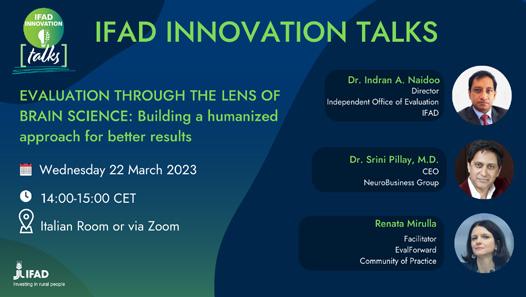
5 minute read
Independent Magazine - Issue 6, 2023
HARNESSING NEUROSCIENCE TO UNLOCK THE TRANSFORMATIVE POTENTIAL OF EVALUATION
There is scope for applying the principles of social neuroscience investigations to the field of evaluation. Evidence suggests that doing so would likely enhance the transformative potential of evaluation by strengthening evaluators’ resilience, and helping them to find the mechanisms that make policies, programmes and interventions work. Having recognized this untapped resource, the Independent Office of Evaluation of IFAD (IOE) has started to apply methods that draw from the field of brain science, and is now working alongside world-renowned keynote speaker, lecturer and author, CEO of Neurobusiness Group, and Harvard trained psychiatrist, Dr Srini Pillay. To discuss the implications and potential ramifications of this cutting-edge approach, Dr Pillay joined Dr Indran A. Naidoo, IOE Director, for an insightful discussion during the thirteenth instalment of the IFAD Innovation Talks series, on 22 March 2023.
Why neuroscience?
In the context of the United Nations, the Secretary-General recently urged all agencies, programmes and funds to explore and apply behavioural science in programmatic and administrative areas. In a similar vein, Dr Naidoo and Dr Srini Pillay believe that the time has come to apply neuroscience principles to the field of evaluation – with a view to transforming the discipline and yielding unprecedented results. Moreover, these principles are already being used to great effect in the fields of crime, justice, security, child development, education, mediation, health, and social well-being and social cohesion.
By their very nature, evaluations are meant to shine a light on the strengths and challenges that people face. While the goal may be to inspire change behaviour in the people who receive those evaluations, several bodies of research from the biological sciences indicate that the approach taken is often misfocused. Emphasizing weaknesses, flaws, or other shortcomings, or even trying to “fix” the problem has an opposite effect. Moreover, this approach will likely activate the negative emotional attractor, cuasing people to defend themselves and, as a result, to close down. Not exactly the desired outcome.
During the Talk, Dr Pillay also explained that people are more likely to reach a destination and appreciate the steps along the way if they are not simply told what to do. Being told what to do creates weaker cognitive maps in the brain because there is no figuring out process that contributes to the plan. Furthermore, many studies have also demonstrated that strengthsbased performance appraisal motivates people to change and align with goals much more than one that looks at strengths and weaknesses or weaknesses alone. While this does not mean that evaluators should only emphasize strengths, it does suggest that the feedback should highlight the capacity to grow that strength.
What is IOE doing?
IOE has already begun a process of using the principles of neuroscience. Examples are the new Evaluation Manual, which was co-created and jointly signed by IOE and IFAD Management – a first in the history of the organization. IFAD also has a new Evaluation Policy, which reflects both independent and self-evaluation, as well as a host of dynamic communication products. These products demonstrate how it is possible to enhance engagement in a constructive fashion, without undermining the principle of independence.
These efforts have been supported by IOE’s unprecedented approach to strategic communications, which has radically evolved during the past two years, revolutionizing the Office’s capacity for dynamic user engagement. Today, the articulate communication offerings present users with an immersive experience, spanning the full spectrum of the evaluation function. Intuitive and easy to navigate, the communication product mix fosters greater user engagement by speaking to the core of what IOE’s audience looks for, bolstering direct and flexible avenues for interaction, and inviting exciting opportunities for people to create a personal connection with the Office in a dynamic fashion. Opportunities for real, tangible change have emerged, as the products are facilitating greater impact of IOE’s work.
The significance of similar undertakings notwithstanding, these results are the proverbial tip of the iceberg as IOE plans to bolster the synergetic use of neuroscience-based principles in its evaluative offerings during the course of 2023. For the first time, the Evaluation Manual will have a section on communication and engagement, which will allow to design evaluation modules that help evaluators to engage in a way that brings about the level of dialogue that IOE is seeking. The section will be followed by a virtual online training course focused on ensuring impactful evaluative communication, and a subsequent training workshop.
About the event
Organized at IFAD’s headquarters in Rome, and live-streamed globally through the Fund’s corporate broadcast channels, the hybrid event saw the participation of over 160 attendants, including delegates and high-level representatives of the Executive Board, as well as a host of development partners, counterparts, stakeholders, and IFAD Senior Management and staff. Renata Mirulla, Facilitator of the EvalForward community of practice, moderated the session.
The IFAD Innovation Talks are a series of learning and knowledge-sharing sessions, lasting one hour. They feature innovative approaches, tools, products and services developed by IFAD, its partners and the members of the IFAD Innovation Network in order to further the aims of the network.








